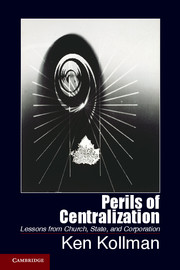4 - Church
Published online by Cambridge University Press: 05 June 2014
Summary
By some measures the largest and oldest organization in the world, the Roman Catholic Church (the Church hereafter), is a marvel of endurance, as well as a fascinating case of institutional evolution. This chapter summarizes key moments in Church history that demonstrate the ways in which its evolution is similar to the other cases highlighted in this book. Subunit leaders have repeatedly assented to representative centralization and, sometimes with great consequence, large enough groups of them have assented to executive centralization. The leaders across multiple levels of Church governance have formed partisan groups pursuing common policies, and most importantly, separated into groupings around the goals of the top leaders. The Church ratcheted toward executive centralization (especially since the mid-nineteenth century). As a result of the executive centralization and partisanship, the Church has locked into a period of centralization with predominant authority residing in the executive above the subunits and the central representative body.
According to Roman Catholic tradition, Jesus Christ founded the Church during his life and then when the Holy Spirit was sent to the Apostles after Christ’s death, the Church began its public ministry. Bishops today are considered descendants of the Apostles. Governance in the Church has long resembled Western European monarchism from medieval and Renaissance times, including the corresponding hierarchical, vassal relationships. Bishops govern the various sees, which are local areas of responsibility (typically geographically defined), like dukes and princes, and altogether serve as the Church hierarchy. Peter the Apostle by tradition was the first pope. By the fact that he and Saint Paul were martyred and buried in Rome, the city and its Christian leaders were accorded special status. Today the Church uses the term pope to refer to the bishop of Rome who traces a direct line of succession back to Saint Peter.
- Type
- Chapter
- Information
- Perils of CentralizationLessons from Church, State, and Corporation, pp. 72 - 104Publisher: Cambridge University PressPrint publication year: 2013



